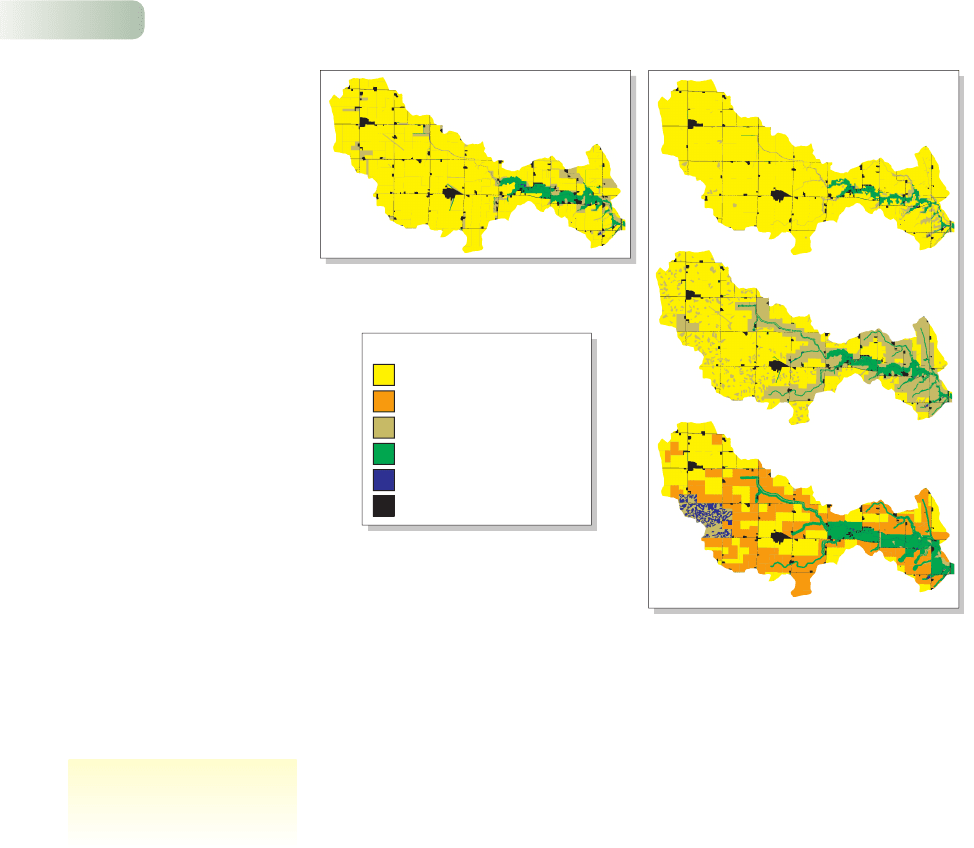Townsend C.R., Begon M., Harper J.L. Essentials of Ecology
Подождите немного. Документ загружается.


into focus three very different ways of looking at our effects on the natural world.
First, there are the environmental outcomes – the realm of the ecologist. But there
are also economic and sociopolitical perspectives. In this section we explore this
triple bottom-line approach to sustainable natural resource use by considering
two examples – one at a regional scale (Section 13.5.1) and the other global
(Section 13.5.2).
13.5.1 Managing an agricultural landscape
When farm production becomes too intensive and widespread, biodiversity is lost
because of the loss of species-rich habitat remnants and the impact of high levels
of pesticides. At the same time there is an adverse effect on ecosystem services,
such as the provision of water of high quality for drinking and contact recreation.
Normally provided ‘free’ from a healthy landscape, these can be lost because
of the input of large quantities of nitrogen and phosphorus, fine sediment from
eroding land, and an increase in water-borne pathogens from farm animals that
affect humans (such as the Giardia parasite).
The impact of agriculture depends on the proportion of the landscape that
is used for production. One small farm – even if there is excessive use of plow,
fertilizer and pesticide – will have little effect on biodiversity and water quality
in the landscape as a whole. It is the cumulative effect of larger and larger areas
of intensive agriculture that depletes the region’s biodiversity and reduces the
quality of water needed for other human activities. In other words, management
of agricultural landscapes needs to be done at a regional scale.
Santelmann et al. (2004) integrated the knowledge of experts in environ-
mental, economic and sociological disciplines into alternative visions of a particular
landscape – the catchment area of Walnut Creek, in an intensively farmed part
of Iowa, USA. They mapped the present pattern of land use and then created
three future management strategies, assessing how farm income, water quality
and biodiversity would be expected to change under each scenario. A production
scenario imagines what the catchment will look like in 25 years if continued
priority is given to corn and soybean production (‘row’ crops), following a
policy that encourages extension of cultivation to all the highly productive soils
available in the catchment. A water quality scenario envisions a new (hypothetical)
federal policy that enforces chemical standards for river and ground water,
and supports agricultural practices that reduce soil erosion. And a biodiversity
scenario assumes a new (hypothetical) federal policy to increase the abundance
and richness of native plants and animals – in this case a network of biodiversity
reserves is established with connecting habitat corridors (including the riparian
zones of rivers).
Figure 13.14 compares for the three scenarios the distribution of agricultural
and ‘natural’ habitats in 25 years’ time. Compared with the current situation,
the ‘production’ scenario produces the most homogeneous landscape, with an
increase in row crops and a decrease in the less profitable pasture and forage
crops. The ‘water quality’ scenario leads to more extensive riparian strips of
natural vegetation cover and more perennial crop cover (pasture and forage
crops), which are conducive to both higher water quality and biodiversity.
Finally, the ‘biodiversity’ scenario has even wider riparian strips together with
prairie, forest and wetland reserves, and an increase in strip intercropping, a
Chapter 13 Habitat degradation
449
comparing three scenarios for
managing a catchment area
9781405156585_4_013.qxd 11/5/07 15:03 Page 449

Part IV Applied Issues in Ecology
450
Present Production
Water quality
Biodiversity
Land cover classes
Row crops
Strip intercropping
Perennial herbaceous cover
Woodland/woody cover
Water/wetland
Urban/residential/roads
Figure 13.14
Present landscape (top left) and
alternative future scenarios for the
Walnut Creek catchment area in
Iowa, USA. In comparison to the
current situation, note how row crops
increase at the expense of perennial
cover in the ‘production’ scenario.
In the ‘water quality’ scenario, note
the increase in perennial cover
(pasture and forage crops) and wider
riparian buffers. In the ‘biodiversity’
scenario, note the increase in strip
intercropping, the wide riparian
buffers and the extensive prairie,
forest and wetland restoration
reserves.
FROM SANTELMANN ET AL., 2004
farmers accept a ‘biodiversity’
scenario despite lower
productivity
farming practice that benefits biodiversity because it increases connectivity between
reserves.
The percentage change after 25 years in economic, water quality and bio-
diversity terms is shown for each scenario in Figure 13.15. Not surprisingly,
the ‘biodiversity’ scenario ranks highest for improvements in plant and animal
biodiversity. More unexpected is the finding that the land use and manage-
ment practices required by the ‘biodiversity’ scenario are nearly as profitable to
farmers as current practices. The ‘biodiversity’ scenario also ranks highest in terms
of acceptability to farmers (based on farmer ratings of images of land cover under
each scenario), and provides water quality improvements similar in magnitude
to those in the ‘water quality’ scenario. Despite the slightly higher profitability of
the ‘production’ scenario, it seems that the farmers would not be unhappy with
a ‘biodiversity’ strategy that provides the greatest benefits to the community at
large in terms of biodiversity and ecosystem services.
13.5.2 Global environmental outcomes of different
sociopolitical scenarios
Dealing with the diversity of views among neighbors in a farming region is
difficult enough, but our biggest environmental problems require a multinational,
global change to the way we deal with nature.
9781405156585_4_013.qxd 11/5/07 15:03 Page 450

An analysis of four contrasting sociopolitical scenarios in Table 13.2 explores
likely trends in climate change, pollution problems and the state of ecosystem
services. If there is little change in our sociopolitical outlook – that is, if our world
remains regionalized and fragmented and mainly concerned with security and
protection – the order from strength scenario is expected to apply, with poor
economic growth, degradation of all ecosystem services and a large increase in
global temperature. A more globally connected society (global orchestration)
could produce higher economic growth and the biggest improvement for the
poorest people, but at the cost of many ecosystem services and with the largest
predicted temperature increase (particularly because of continued heavy fossil
fuel use). The scenario adapting mosaic, of a world driven by local communities
focusing on sound environmental management (such as our regional example
in Section 13.5.1) would lead to the smallest economic growth, improvements
to all ecosystem services and an intermediate rise in global temperature. Finally,
the technogarden scenario, with its environmentally sound but highly managed
ecosystems, and crucially with a climate change policy (stabilizing carbon dioxide
at 550 ppm), leads to the smallest rise in temperature, reduces nutrient pollution
of waterways and improves ecosystem services – except cultural ones, because
many ecosystems are managed and unnatural.
Which of these, or other, scenarios comes to pass depends on a wide range of
sociopolitical factors. Watch this space!
Chapter 13 Habitat degradation
451
Figure 13.15
Percent change in the Walnut Creek catchment area for each
scenario (‘production’, ‘water quality’ and ‘biodiversity’, compared
to the current situation) in water quality measures (sediment,
nitrate concentration), an economic measure (farm income in
the catchment as a whole), a measure of farmer preference for
each scenario (based on farmer ratings of images of what the land
cover would look like under each scenario) and two biodiversity
measures (plant and vertebrate). The ‘biodiversity’ and ‘water
quality’ scenarios rank above the ‘production’ scenario in all but
economic profitability.
200
150
100
50
0
–50
–100
% change over 25 years
Sediment export
(tonnes yr
–1
)
Nitrate export
(kg yr
–1
)
Farm income (US$
per catchment)
Farmer
preference
Plant
biodiversity
Vertebrate
biodiversity
Production
Water quality
Biodiversity
AFTER SANTELMANN ET AL., 2004
9781405156585_4_013.qxd 11/5/07 15:03 Page 451

Part IV Applied Issues in Ecology
452
Table 13.2
Four scenarios that explore plausible futures for ecosystems and human well-being based on different assumptions about sociopolitical forces of
change and their interactions. Greenhouse gas emissions [carbon dioxide (CO
2
), methane (CH
4
), nitrous oxide (N
2
O) and ‘Other’] are expressed
as gigatons of carbon-equivalents (GtC-eq).
FROM TOWNSEND, 2007; BASED ON MILLENNIUM ECOSYSTEM ASSESSMENT, 2005
Global orchestration
A globally connected society focused
on global trade and economic
liberalization. Assumes a reactive
approach to ecosystem problems.
Takes strong steps to reduce poverty
and inequality and to invest in public
goods such as infrastructure and
education. Economic growth is the
highest of the four scenarios, while
population in 2050 is lowest (8.1 billion)
Order from strength
A regionalized and fragmented world,
concerned with security and protection,
emphasizing primarily regional markets,
paying little attention to public goods
and taking a reactive approach to
ecosystem problems. Economic
growth rate is the lowest (particularly in
developing countries) while population
growth is the highest of the scenarios
(9.6 billion in 2050)
Adapting mosaic
River catchment-scale ecosystems are
the focus of political and economic
activity. Local institutions are
strengthened and local ecosystem
management strategies are common,
with a strongly proactive (and learning)
approach. Economic growth is low
initially but increases with time.
Population in 2050 is high (9.5 billion)
Technogarden
A globally connected world relying on
environmentally sound technology,
using highly managed, often
engineered, ecosystems to deliver
ecosystem services, and taking a
proactive approach to ecosystem
management. Economic growth is
relatively high and accelerating, while
the 2050 population is midrange
(8.8 billion). This is the only scenario
to assume a climate policy (stabilizing
CO
2
at 550 ppm)
GREENHOUSE
GAS
EMISSIONS
TO 2050
CO
2
: 20.1 GtC-eq
CH
4
: 3.7 GtC-eq
N
2
O: 1.1 GtC-eq
Other: 0.7 GtC-eq
CO
2
: 15.4 GtC-eq
CH
4
: 3.3 GtC-eq
N
2
O: 1.1 GtC-eq
Other: 0.5 GtC-eq
CO
2
: 13.3 GtC-eq
CH
4
: 3.2 GtC-eq
N
2
O: 0.9 GtC-eq
Other: 0.6 GtC-eq
CO
2
: 4.7 GtC-eq
CH
4
: 1.6 GtC-eq
N
2
O: 0.6 GtC-eq
Other: 0.2 GtC-eq
PREDICTED
TEMPERATURE
RISE TO 2050
AND 2100
2050: +2.0°C
2100: +3.5°C
2050: +1.7°C
2100: +3.3°C
2050: +1.9°C
2100: +2.8°C
2050: +1.5°C
2100: +1.9°C
LAND USE
CHANGES
TO 2050
Slow forest
decline to
2025, 10%
more arable
land
Rapid forest
decline to
2025, 20%
more arable
land
Slow forest
decline to
2025, 10%
more arable
land
Forest
increase to
2025, 9%
more arable
land
NITROGEN
TRANSPORT
IN RIVERS
TO 2025
Increased
nitrogen
in rivers
Increased
nitrogen
in rivers
Increased
nitrogen
in rivers
Decreased
nitrogen
in rivers
ECOSYSTEM
SERVICES
TO 2025
Provisioning
services
improved,
regulating and
cultural services
degraded
All ecosystem
services heavily
degraded
All ecosystem
services
improved
Provisioning and
regulating
services
improved,
cultural services
degraded
9781405156585_4_013.qxd 11/5/07 15:03 Page 452

Chapter 13 Habitat degradation
453
s
Physical and chemical impacts of human
activities
People physically degrade or chemically pollute
natural ecosystems when generating power or devel-
oping land for agricultural, urban and industrial
purposes. Humans are not unique among species in
degrading their environment, and when our popula-
tion density was low, and prior to our harnessing of
non-food energy, humans probably had no greater
impact than many other species. But now the scale of
human effects is proportional to our huge numbers
and advanced technologies.
Habitat degradation has costs in terms of human
health and lost ecosystem services, including pro-
visioning services (such as wild foods and drinking
water), cultural services (including educational and
recreational opportunities), regulating services (such
as the ecosystem’s ability to break down pollutants or
regulate climate) and supporting services (including
primary production and soil formation).
Degradation via cultivation
The intensive production of livestock in factory farming
is seriously polluting, and agricultural slurry may need
to be thinly dispersed over extensive farmland to dilute
it to a level that natural decomposers can deal with it.
Intensive agriculture is associated with an increase
in the nitrate and phosphate that runs into rivers, lakes
and oceans. The consequent eutrophication may be
counteracted by matching fertilizer supply to crop
demand, restoring natural wetlands (or constructing
artificial ones) to take up some of the excess nutrients
before they enter rivers and, in lakes, by biomanipulat-
ing the level of grazing on phytoplankton to increase
water clarity.
Many manufactured pesticides have become
important environmental pollutants. Problems arise
when pesticides are toxic to many more species than
just the target and particularly when they drift beyond
the target areas and persist in the environment.
The organochlorine insecticides have been particu-
larly problematic because they are progressively
biomagnified in animals further up the food chain. Top
predators in aquatic and terrestrial food chains, which
were never intended as targets, can then accumulate
very high doses.
Cultivation can also physically degrade a landscape
through the loss of habitat diversity, while heavy irriga-
tion depletes water in rivers and changes their patterns
of flow, with adverse consequences for river inhabitants.
Power generation and its diverse effects
Our use of fossil fuels has provided the power to
transform much of the face of the planet through
intensive agriculture, urbanization and industrial devel-
opment. The polluting effects of burning coal and oil
include acid rain, which can affect lakes and forests
in neighboring countries, and a dramatic increase in
atmospheric carbon dioxide, which is responsible for
climate change at the global level.
Recent emphasis has been placed on developing
alternative energy sources that do not release carbon
dioxide. The cleanest and safest technologies are
expected to derive from hydropower schemes (already
at a technologically advanced state in many parts of
the globe), together with wind farms (rapidly develop-
ing, but with potential adverse consequences for
migrating birds) and solar and wave power. Nuclear
power, whose popularity had declined because of
concerns over security and radioactive waste disposal,
is receiving renewed consideration because it does
not release greenhouse gases.
Degradation in urban and industrial landscapes
Our feces and urine create large disposal problems
in towns and cities because density is so high. At its
simplest, primary sewage treatment simply removes
most of the solid organic matter. Secondary treatment
mimics natural decomposition processes, eliminat-
ing organic matter but leaving high concentrations
of nitrate and phosphate in the waste water. Tertiary
treatment chemically removes these nutrients.
Exotic industrial chemicals also find their way into
waterways and the atmosphere where they cause
diverse problems. For example, chlorofluorocarbon
compounds (CFCs), developed as aerosols and
SUMMARY
Summary
9781405156585_4_013.qxd 11/5/07 15:04 Page 453

Part IV Applied Issues in Ecology
454
refrigerants and used on a very large international
scale, were found to pose the threat that their chlorine
content could interact with and destroy atmospheric
ozone, which normally protects the worlds’ biota
from harmful UV radiation. International agreement
to phase out CFCs is expected to solve the problem
by 2050 (including recovery of the substantial ozone
hole that forms annually over Antarctica).
Mining activities, whether for fossil fuels or metals,
also cause physical and chemical degradation to
surrounding ecosystems. For example, more than
1 million tonnes of oil enters the world’s waterways
every year from wells drilled into the seabed or from oil
tankers, with adverse consequences for marine life.
Mining for metals such as copper may also pollute at
every stage of extraction, purification and disposal.
Land that has been damaged by mining is usually
unstable, liable to erosion and devoid of vegetation.
The simplest solution to land reclamation is the re-
establishment of vegetation cover, because this will
stabilize the surface, be visually attractive and self-
sustaining. Candidate plants for reclamation are those
that are tolerant of the toxic heavy metals present.
Maintenance and restoration of ecosystem
services
The concept of ecosystem services brings into focus
three very different ways of looking at our effects on the
natural world – the triple bottom-line of environmental,
economic and sociopolitical perspectives. Planning
for sustainable use of natural resources usually needs
to be carried out at regional or global scales.
The impact of agriculture depends on the propor-
tion of the landscape that is used for production, and
planning needs to be done at the regional scale and
involve the knowledge of experts in environmental,
economic and sociological disciplines. Dealing with
the diversity of views among neighbors is difficult
enough, but our biggest environmental problem –
climate change due in large measure to the burning
of fossil fuels – requires a multinational, global level
of planning.
s
REVIEW QUESTIONS
Review questions
Asterisks indicate challenge questions
1 What are the features that distinguish human
pollution of the environment from that by other
social organisms?
2 Explain why it may be impossible to achieve
increasing agricultural production without
creating unacceptable levels of nitrate in
drinking water.
3* Consider the toilet that you most frequently use.
Find out where your sewage goes and how it is
treated. What pollution problems are you
contributing to as a result of your sewage
disposal?
4 Describe the causes of acid rain and the way
in which it damages terrestrial and aquatic
communities.
5* Hydroelectric schemes provide one of the least
polluting ways of generating power.
Nevertheless, they have a number of negative
effects on natural systems. What are they?
6 Define the characteristics that make some
pesticides particularly dangerous pollutants.
7 Describe the ways in which the use of metals by
humans has created problems of environmental
pollution.
8 Define the greenhouse effect and list the
pollutants that contribute to it.
9* Review the case of the Asian vultures heading
to extinction (see Section 1.3.4) and describe
the ecosystem services that would be lost with
the vultures. In outline, describe how economic
value could be estimated for these services.
10* It is often argued that environmental pollution
can be prevented only by ‘making the polluter
pay’. Discuss the ways in which this is, or might
be, done.
9781405156585_4_013.qxd 11/5/07 15:04 Page 454

455
Chapter 14
Conservation
CHAPTER CONTENTS
14.1 Introduction
14.2 Threats to biodiversity
14.3 Conservation in practice
14.4 Conservation in a changing world
14.5 Finale
Chapter contents
KEY CONCEPTS
In this chapter you will:
l
recognize that in seeking to conserve the Earth’s species and
communities, we are often woefully ignorant of what there is to
conserve
l
appreciate that endangered species are usually rare, but not all rare
species are endangered
l
understand that some species are at risk for a single reason, such as
overexploitation, habitat disruption or introduced species, but often
a combination of factors is at work
l
recognize that populations that become very small may experience
genetic problems
l
understand that conservation involves the development of species
management plans but also often requires a broader, community
perspective
l
appreciate that global climate change further complicates conservation
planning
Key concepts
9781405156585_4_014.qxd 11/5/07 15:05 Page 455

14.1 Introduction
The term biodiversity makes frequent appearances in both the popular media and
the scientific literature – but it often does so without an unambiguous definition.
At its simplest, it is species richness, the number of species present in a defined
geographic unit (see Chapter 10). Biodiversity, though, can also be viewed at scales
smaller and larger than the species. For example, we may include genetic diversity
within species, perhaps seeking to conserve genetically distinct subpopulations and
subspecies (see Chapter 8). Above the species level, we may wish to ensure that
species without close relatives are afforded special protection, so that the overall
evolutionary variety of the world’s biota is maintained as large as possible. At a larger
scale still, we may include in biodiversity the variety of community types present
in a region – swamps, deserts, early and late stages in a woodland succession and so
on. Thus, ‘biodiversity’ may itself, quite reasonably, have a diversity of meanings.
Yet it is necessary to be specific if the term is to be of any practical use. Ecologists
must define precisely what it is they mean to conserve in their particular circum-
stances, and how to measure whether this has been achieved.
Most often the focus of concern of conservation biologists is the rate of extinc-
tion of species in the face of human influence. To judge the scale of this problem,
we need to know the total number of species that occur in the world, the rate at
which these are going extinct and how this rate compares with that of pre-human
times. Unfortunately, there are considerable uncertainties in our estimates of all
these things. About 1.8 million species have so far been named (Figure 14.1), but
the real number must be much larger. Estimates have been derived in a variety
of ways. One approach, for example, uses information on the rate of discovery of
new species to project forward, group by taxonomic group, to a total estimate of
up to 6–7 million species in the world. However, the uncertainties in estimating
global species richness are profound and our best guesses range from 3 to 30 million
or more (Gaston, 1998).
An important lesson from the fossil record is that the vast majority of (probably
all) species eventually become extinct – more than 99% of species that ever
existed are now extinct. However, given that individual species are believed, on
average, to have lasted about 1–10 million years, and if we estimate conservatively
that the total number of species on Earth is 10 million, we would predict that only
an average of between 100 and 1000 species (0.001–0.01%) would go extinct each
Part IV Applied Issues in Ecology
456
what is biodiversity?
Natural ecosystems have been placed at threat by a plethora of human influences,
particularly in the face of a burgeoning human population. Conservation is the
science concerned with increasing the probability that the Earth’s species and
communities (or, more generally, its biodiversity) will persist into the future.
We need to appreciate the scale of the problem, understand the threats posed
by human activities and consider how our knowledge of ecology can be
brought to bear to provide remedies.
estimates of the number of
species on Earth range from 3
to 30 million or more
modern extinction rates
compared to historical
extinction rates
9781405156585_4_014.qxd 11/5/07 15:05 Page 456

Chapter 14 Conservation
457
Algae, amoebae, etc.
012345678
Number of species (in millions)
Insects, centipedes and millipedes
Spiders, mites, etc.
Fungi
Nematodes, worms
Plants
Mollusks
Crustaceans
Vertebrates
Named species
Unnamed species (estimate)
Figure 14.1
Numbers of species identified and
named (maroon histograms) and
estimates of unnamed species that
exist (green histograms).
MODIFIED FROM MILLENNIUM ECOSYSTEM ASSESSMENT, 2005
14.1 TOPICAL ECONCERNS
14.1 Topical ECOncerns
To most people, biological diversity is undeniably of
value but standard economics has generally failed
to assign value to ecological resources. Thus, the
costs of environmental damage or depletion of living
resources have frequently been disregarded. A major
challenge is the development of a new ecological
economics (Costanza et al., 1997) in which the worth
of species, communities and ecosystems can be
assigned financial value to be set against the gains
to be made in industrial and other human projects
that may damage them. As we saw in Section 13.1.2,
the value of biodiversity can be measured in terms
of the ‘free’ ecosystem services it provides.
Many species have direct value and many more
are likely to have a potential value that as yet remains
untapped. For example, wild meat, fish and plants
remain vital resources in many parts of the world,
while most of the world’s food is derived from plants
that were originally domesticated from wild plants in
tropical and semiarid regions. In future, wild strains of
these species may be exploited for their genetic diver-
sity, and quite different species of plants and animals
may be found that are appropriate for domestication.
Secondly, as we saw in Chapter 12, the potential
benefits that might come from natural enemies if they
could be used as biological control agents for pest
What is the value of biodiversity?
century. The current observed rate of extinction of birds and mammals of about
1% per century is 100–1000 times this ‘natural’ background rate. Furthermore,
the scale of the most powerful human influence, habitat destruction, continues
to increase.
The evidence, then, while inconclusive to a degree because of the unavoidable
difficulty of making accurate estimates, suggests that our children and grand-
children may live through a period of species extinction comparable to the
‘natural’ mass extinctions evident in the geological record (see Section 10.6).
But should we care? To most, the answer is a resounding and unhesitating ‘Yes’.
Whether the answer seems obvious or debatable, however, it is important to
consider why we should care – why biodiversity is valuable (Box 14.1).
s
9781405156585_4_014.qxd 11/5/07 15:05 Page 457

Part IV Applied Issues in Ecology
458
species are enormous; most natural enemies of
most pests remain unstudied and often unrecognized.
Finally, about 40% of the prescription and non-
prescription drugs used throughout the world have
active ingredients extracted from plants and animals.
Aspirin, probably the world’s most widely used drug,
was derived originally from the leaves of the tropical
willow, Salix alba. The nine-banded armadillo (Dasypus
novemcinctus) has been used to study leprosy and pre-
pare a vaccine for the disease; the Florida manatee
(Trichechus manatus), an endangered mammal, is
being used to help understand hemophilia; while the
rose periwinkle (Catharanthus roseus), a plant from
Madagascar, has yielded two potent drugs effective in
treating blood cancer. In all these cases, the species can
be thought of as representing provisioning ecosystem
services (see Section 13.1.2).
Other species have indirect economic value.
For example, many wild insects are responsible for
pollinating crop plants. This is another provisioning
service. In a different context, the monetary value
of ecotourism, which depends on biodiversity, is
becoming ever more considerable. Each year, nearly
200 million adults and children in the USA take part
in nature recreation and spend about $4 billion on
fees, travel, lodging, food and equipment. Moreover,
ecotourists, who visit a country wholly or partly to experi-
ence its biological diversity, spend approximately
$12 billion a year worldwide on their enjoyment of
the natural world (Primack, 1993). On a smaller scale,
a multitude of natural history films, books and edu-
cational programs are ‘consumed’ annually without
harming the wildlife upon which they are based. In these
contexts, biodiversity provides cultural ecosystem
services. More ingenuity is required to find ways to
measure the indirect economic benefits that accrue
as a result of natural biodiversity; for example, bio-
logical communities can be of vital importance by
maintaining the chemical quality of natural waters, in
buffering ecosystems against floods and droughts,
in protecting and maintaining soils, in regulating local
and even global climate, and in breaking down or
immobilizing organic and inorganic wastes. All of these
are regulating ecosystem services.
It should be noted that many people point to
ethical grounds for conservation, with every species
being of value in its own right – a value that would still
exist even if people were not here to appreciate or
exploit them. From this perspective even species with
no conceivable economic value require protection.
It would be wrong, though, to see things only from
the point of view of conservation – not that there are
really arguments against conservation as such, but
there are arguments in favor of the human activities
that make conservation a necessity: agriculture, the
felling of trees, the harvesting of wild animal popula-
tions, the exploitation of minerals, the burning of
fossil fuels, irrigation, the discharge of wastes and
so on. To be effective, it is likely that the arguments
of conservationists must ultimately be framed in
cost–benefit terms because governments will always
determine their policies against a background of the
money they have to spend and the priorities accepted
by their electorates.
A government conservation authority is considering
a proposal to designate a marine reserve at a rocky
promontory of great scenic beauty. The site is very
diverse in species, including a few that are rare. Com-
mercial and recreational fishers wish to continue
fishing at this unusually productive site, local people
have mixed feelings about an expected influx of
tourists, while conservationists (who mostly live a long
way from the site) believe that the conservation value
is such that no fishing should be permitted and visitor
numbers should be strictly controlled. Imagine that you
are an arbitrator chairing a meeting of all interested
parties. What arguments do you think they will put
forward? What decision would you reach and why?
s
9781405156585_4_014.qxd 11/5/07 15:05 Page 458
